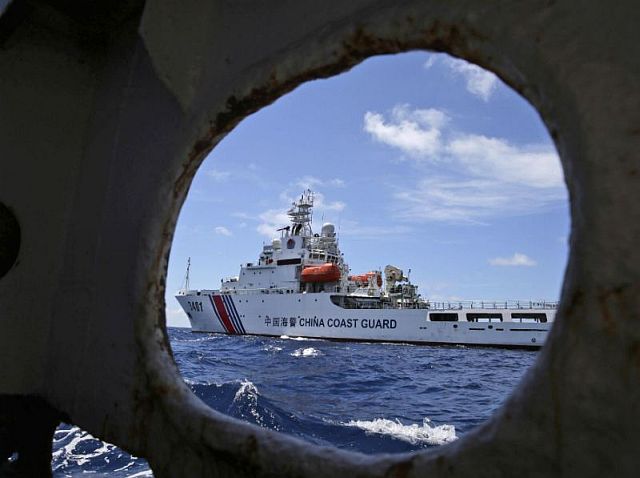
A Chinese Coast Guard ship attempts to block a Philippine government vessel as the latter tries to enter Second Thomas Shoal in the South China Sea to relieve Philippine troops and resupply provisions in this May 29, 2014 photo. (AP)
WASHINGTON — The United States should be willing to use military force to oppose Chinese aggression at a disputed reef off the coast of the Philippines, a former commander of US forces in the Pacific told a congressional hearing on Wednesday.
Dennis Blair made the recommendation to a Senate panel, a day after an international tribunal invalidated Beijing’s expansive claims in the South China Sea.
The objective was not to pick a fight with China at the disputed Scarborough Shoal, but to set a limit on its military coercion, Blair said.
“I think we need to have some specific lines and then encourage China to compromise on some of its objectives,” he told the hearing.
The Philippines is a US ally, but their treaty is ambiguous about whether the US would come to its defense in disputed territory.
A 2012 standoff at Scarborough Shoal between Chinese and the Philippine vessels prompted Manila to launch the arbitration case.
China has rejected the tribunal’s ruling, and on Wednesday warned other countries against threatening its security in the South China Sea. Vice Foreign Minister Liu Zhenmin said Beijing could declare an air defense identification zone over the waters if it felt threatened. China, however, also extended an olive branch to the new Philippine government, saying the Southeast Asian nation would benefit from cooperating with China.
Blair, also a former director of national intelligence, said China has alienated its neighbors through its aggressive actions in the South China Sea, including its reclamation of land and construction of airstrips and ports in the Spratly Islands.
He advised a careful US approach following the tribunal ruling to give Beijing opportunity to change course.
Kurt Campbell, former top US diplomat for East Asia and now an adviser on Asia policy for the presidential campaign of Hillary Clinton, said, “I think over time China will start to adjust its position, because they will realize it’s not in their best strategic interests.”

